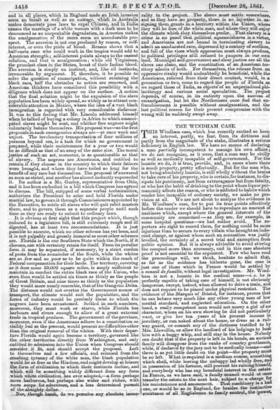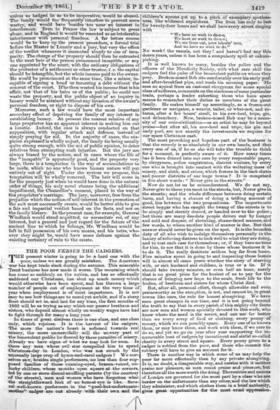THE WINDHAM CASE.
THIS Windham case, which has recently excited so keen an interest, partly, we fear, from its dirtiness and partly from the magnitude of the stake, illustrates a serious deficiency in. English law. We have no means of declaring a man partially incompetent to manage his own affairs ; we do not recognize, as it were, that a man may be civilly as well as medically incapable of self-government. For the lunatic we do, it is true, provide, and, in cases where there is much property, pretty effectually. ]3u.t for the man who, not being absolutely lunatic, is still wholly without the brains to take care of his property, who is certain,for instance, to dis- sipate his patrimony, not from extravagance but from fatuity, or who has the habit of drinking to the point where liquor per- manently affects the reason, or who is addicted to habits which render him incapable of ordinary society, we make no pro- vision at all. We are not about to analyze the evidence in Mr. Windham's case, for to put its true points effectively before the reader we should have to reproduce an amount of nastiness which, except where the general interests of the community are concerned— as they are, for example, in some hospital questions—we had rather avoid. The re- porters are right to record them, for nothing could be more injurious than to secure to every villain who brought an inde- cent charge, or against whom such an accusation was justly levelled, the certainty of a secret trial and exemption from public opinion. But it is always advisable to avoid stirring the cesspool more than necessary, and in this case absolute proof is not essential to the argument. Few who have read the proceedings will, we think, hesitate to admit that, as far as the evidence has hitherto gone, the case is just one of those which in. France would be settled by a conseil de famille, without legal investigation.. Mr. Wind- ham is not a lunatic in the medical sense—i. e. he is perfectly capable of taking care of himself, is not obviously dangerous, except, indeed, when allowed to drive a train, and does not require to be placed under physical restraint. The evidence of the Marquis of Bristol, for instance, proves that he can behave very much like any other young man of low mental standard, and neglected education. On the other hand, a really competent man would not marry a girl of no character, whom on his own showing he did not particularly want, or give her ten years of his present income in jewellery, or run naked about the house, or dress as a rail- way guard, or commit any of the dirtiness testified to by Mrs. Llewellin, or allow the landlord of his lodgings to beat him with a buggy whip, and still stay in the house. Nobody can doubt that if the property is left in his hands, an ancient family will disappear from the ranks of country gentlemen, while, if declared by the jury not to be medically insane—and there is as yet little doubt on the point—the property inust be so left. What is required is a medium course, something which shall, while leaving the unhappy lad wholly free, and in possession of his fortune, still prevent his ruining himself, and everybody who has any beneficial interest in the estate. In France, as we have said, a family council would at once transfer the estate to the next heir, subject to a charge for his maintenance and amusement. That machinery is a bad one, or would be so in England, for besides the instinctive resistance of all Englishmen to family control, the Tower, unless so hedged in as to be inoperative, would be abused. The family would too frequently interfere to prevent mere wastry, and would have besides too near an interest in interference. Even in France the law is subject to great abuse, and in England it would be resented as an intolerable interference with personal freedom. A far better course would be to keep up the present procedure, a formal trial before the Master in Lunacy and a jury, but vary the effect of the verdict whenever it amounted simply to one of inca- pacity. The charge of the property should then be entrusted to the next heir of the person pronounced incaphble, or any one appointed by the court, with the ordinary obligations of the protector of a settlement or other trustee, i. e. the capital should be intangible, but the whole income paid to the owner. He would be pronounced at the same time, like a minor, in- capable of signing a bond or incurring a debt without the consent of the court. If he then wasted his income that is his affair, not that of his heirs or of the public; he could not waste the property, and the -public object of an inquiry in lunacy would be attained without any invasion of the owner's personal freedom, or right to dispose of his own. Moreover, such a law would have the most important secondary effect of depriving the family of any interest in establishing lunacy. At present the nearest relative of any large proprietor has an apparent interest in making him out a lunatic. Indeed, the case is always conducted on that supposition, with regular attack and defence, instead of simply praying for aid. In the majority of cases, the sus- picion expressed is wholly unjust, the family tie being usually quite strong enough, with the aid of public opinion, to deter relatives from attempting such injustice. But the jury are always biased by the notion, and in cases where the life of the "incapable" is apparently good, and the property very large, there is a temptation in the way of accumulations to be made, which no one who knows human nature will put entirely out of sight. Under the system we propose, this temptation will be wholly removed. The heir will come in for the property just when he would have done in the natural order of things, his only novel chance being the additional impediment, the Chancellor's consent, -placed in the way of the proprietor's marriage. The jury, moreover, free from the prejudice which the notion of self-interest in the promotion of the suit must necessarily create, would be better able to give a fair and impartial verdict based on the facts, and not on the family history. In the present case, for example, General Windham would stand acquitted, ex necessitate rei, of any interest, but a general and just regard for the future of the ancient line to which he belongs, Mr. Windham would be left in full possession of his own means, and his heirs, who- ever they might be, -would have some defence against the existing certainty of ruin to the estate.





























 Previous page
Previous page